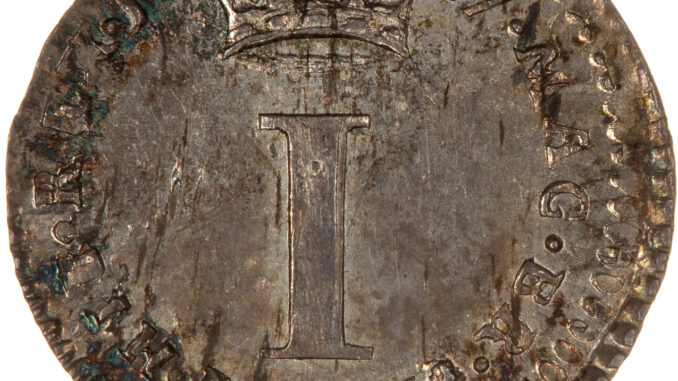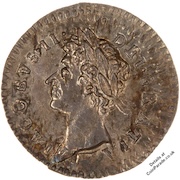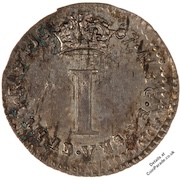
 The 1687 Penny - James II
The 1687 Penny - James IISilver Penny of King James II minted at the Royal Mint (Tower Mint) in 1687. The coin has the same design as the Maundy money.
No copper pennies were minted by James II, but he did mint tin halfpennies and farthing.
The Obverse shows the laureate head of King James II facing left. The legend is "IACOBVS II DEI GRATIA" meaning "James II by the grace of God".
The edge is plain.
 The Reverse shows a Roman numeral I below a crown. Legend is "MAG BR FRA ET HIB REX 1686".
The Reverse shows a Roman numeral I below a crown. Legend is "MAG BR FRA ET HIB REX 1686".Image credit: Museums Victoria
Mintage: Not known
Minted at The Royal Mint
SCBC: 3417
More information (monarch, year, mint, country, category) can be found below coin listings.
Below are some coins currently being offered on eBay. As an eBay Partner, We may be compensated if you make a purchase.
List items on:
List items on:
Remember 1687 ?
Monarch is King James II. Isaac Newton publishes Philosophiæ Naturalis Principia Mathematica.
James II (1685-1688)
James was King of England and Ireland as James II and King of Scotland as James VII, from 6 February 1685 until he was deposed in the Glorious Revolution of 1688. Born on 14 October 1633, the brother of Charles II, at St James's Palace, London and died 16 September 1701. Many dies engraved by John Roettier (1631-1700).On coins, James II is usually written as Latin: IACOBVS II.
The regnal years used on James II coins were:
1686:SECVNDO; 1687:TERTIO; 1688:QVARTO.
Category: Penny
The Penny is one of the most famous British coins. The coin itself has been around since 600AD and at various times has been struck in silver, copper and bronze. Originally split into halfpennies and farthing, it is now itself the least denomination coin currently in circulation. Made from copper (actually copper plated steel). Originally there were 12 pennies in one shilling and 240 pennies in £1; since decimalisation in 1971 there are 100 new pence in one pound.
Composition: Early pennies were Silver, then Copper, Bronze and Copper coated steel.
Collection: Maundy Money
Maundy Money are coins traditionally given out by the Monarch as a gift to the poor at Royal Maundy. The ceremony, which is associated with Christianity, is held on Maundy Thursday which is the day before Good Friday. The Maundy set consists of four coins, denominated one penny, two pence, three pence and four pence. The number of sets given out to each man and woman is equivalent to the age of the Monarch in years.
Which Mint: The Royal Mint
The Royal Mint is the designated place for the UK to mint coins. It dates back well over 1000 years and is a Government-owned company. Formed in the reign of Alfred the Great about the year 886, during the period 1279-1812 it was generally referred to as The Tower Mint as it was housed at the Tower of London. The Master of The Royal Mint has included famous figures such as Sir Isaac Newton.
Since 2010 it has operated as Royal Mint Ltd, a company owned by HM Treasury, under an exclusive contract to supply all coinage for the UK although it also produces medals and coins for other countries. It is currently located at Llantrisant, Wales.
Country of Origin: United Kingdom
The United Kingdom (UK) is the Union of England, Scotland, Wales and Northern Ireland. It is often refered to as Great Britain (GBR). It has a long, rich history. The orignal coinage was Pounds, Shillings and Pence but since decimalisation on 15 February 1971, it is £1 = 100p, that is One Pound = 100 pence. The coinage of the UK is also a long history, the Royal Mint being established as long ago as 886AD when coins were hammered. Today there is perhaps 30 billion coins in circulation, and many (numismatic) collectors coins and sets are issued frequently in gold, silver and other metals.




